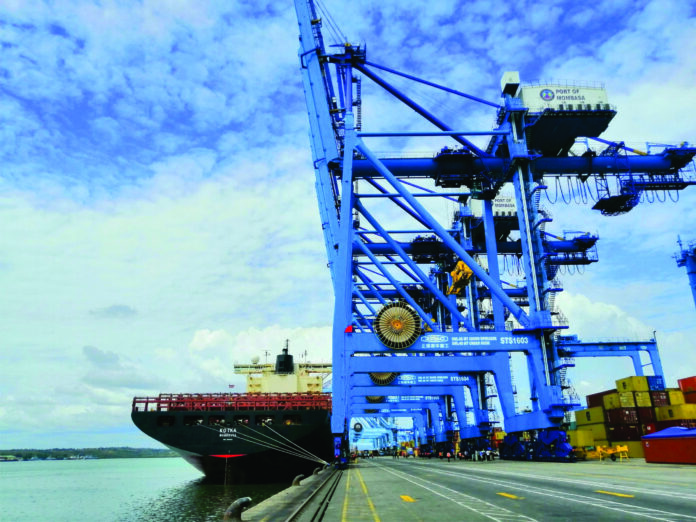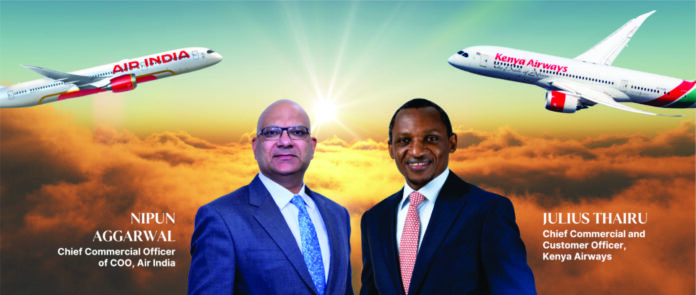Port of Mombasa Registers Cargo Throughput Growth
The Port of Mombasa has registered a remarkable increase in cargo throughput of 14 per cent in 2024 as it handled 41.1 million tons compared to 35.98 million tons in 2023.
The container traffic saw a record-breaking increase, with a 23.53% growth to 2,005,076 TEUs, highlighting the continent’s growing role in global trade.
Container traffic through the Mombasa port reached a record 2,005,076 twenty-foot equivalent units (TEUs) in the year to December 2024, up from 1,623,080 the previous year.
This remarked performance however fell short of Kenya Ports Authority (KPA) projected 2.2 million TEUs by the end of 2024.
Container traffic experienced a significant upward trend in December 2024, with 188,495 TEUs processed compared to 152,326 TEUs handled in December 2023.
Transshipment traffic for the month reached 42,681 TEUs, a 25.8% increase, while transit traffic registered 1,184,541 tons, up by 22.2% from December 2023.
Africa’s strategic geographic location at the crossroads of major global shipping routes positions it as an essential hub for global container traffic.
Between the first half of 2018 and the first half of 2023, port calls by container ships rose by 20% in Africa, while tanker calls grew by 38%.
The Red Sea shipping crisis has had a significant impact on Africa, with some shipping lines avoiding the Red Sea route, potentially leading to higher costs for East African importers.
Effective port development and the development of a harmonized transit system in road and rail infrastructure are crucial for improving connectivity and creating trade opportunities for transit and landlocked countries in Africa.
Kenya is likely to diversify its import sources further, reducing dependency on traditional markets and exploring new partnerships, particularly within the East African region.
Container traffic through the Mombasa port grew 23.53 percent to a record 2,005,076 twenty-foot equivalent units (TEUs) in the year to December 2024, the Kenya Ports Authority (KPA) said, up from 1,623,080 registered the previous year.
Last year the port surpassed the 2023 target of 1.6 million TEUs, with the volumes reaching 1.75 million TEUs by the month of September last year.
The KPA Managing Director Captain William Ruto had attributed the growth to improved operational efficiency and streamlined processes at the facility.
Ruto noted that KPA’s cargo volumes over the past two years have outpaced projections, with current port capacity standing at 2.1 million TEUs.
He revealed that KPA is working to boost the Port’s Capacity by expanding Container Terminal 1 also known as Berth Number 19B adding that they will soon sign the contract with the contractor to add 240 meters of key length, an additional capacity of 300,000 TEUs.

“Before I took over as the CEO, the port was doing 1.4 million twenty-foot equivalent units (TEUs), and at the end of my first year, at the end of 2023, we did 1.6 million TEUs, a growth of 12 percent from the previous 0.4 percent,” Ruto said.
He noted that KPA now serves over eight transit countries, with the transit market growing by more than 35%.
Additionally, the port is implementing major upgrades, including modernizing the Terminal Operating System and acquiring advanced equipment to boost operational efficiency.
Ruto emphasized his commitment to reducing costs and promoting environmental sustainability through strategic investments, such as the new oil terminal.
He said the move has significantly reduced ship waiting times and addressed the long-standing issue of high demurrage costs, which have previously driven up fuel prices.
In a move towards greener logistics, petroleum products are now being transported via ships to Kisumu, removing approximately 158 trucks from the road per journey in a bid to cut carbon emissions and improve road safety by reducing heavy truck traffic.
“KPA’s investment in the oil terminal underscores its commitment to modernization, economic growth, and environmental sustainability. As the project progresses, it is set to reinforce Kenya’s leadership in innovative port management across Africa,” Ruto said.
TAAG Angola Airlines Gets Its 1st Boeing 787 Dreamliner
Angolan flag carrier TAAG Angola Airlines has received the first of four Boeing 787 Dreamliners, just over a year after placing the order. The airline is undergoing significant transformation, with new aircraft, a new hub, and a new brand identity.
The first 787 arrives in Luanda
The new 787-9, registered as D2-TEQ, arrived at TAAG’s new hub at Luanda Dr Agostinho Neto International Airport (NBJ) on January 29. The aircraft departed Everett at 10:14 and landed in Luanda at 12:13 local time, where it was welcomed with a celebratory water cannon salute and received by the airline’s and country’s officials.
It is one of four Boeing 787s ordered by the airline in October 2023 . The first aircraft was initially expected to be delivered as early as August 2024. According to TAAG, the 787 has 313 passenger seats, split between 16 in business and 297 in economy and economy-premium class. TAAG has three more Dreamliners on order: one 787-9 and two 787-10s. The aircraft will support its fleet modernization plans and boost its long-haul capacity. TAAG Angola Airlines CEO Nelson Rodrigues said:
“The delivery of the 787-9 is a pivotal step in our strategy to modernize TAAG Angola Airlines’ fleet. This airplane brings the efficiency and versatility we need to meet growing market demands, replace our aging widebody fleet, and deliver a world-class experience to our passengers.”
The new Dreamliner is on a sale and leaseback agreement with AerCap , making it the first lessor to introduce the 787 to the Angolan carrier. The pre-delivery payment for the fleet is financed by a consortium led by the Africa Export-Import Bank (Afreximbank) and Absa, one of Africa’s largest banks. The transaction builds on the 2019 collaboration, where Absa facilitated a $148 million deal for six Dash 8-Q400 for TAAG.
Enhancing long-haul capabilities
Angola’s government has ambitious plans to increase international tourism and trade, which involves increasing connectivity to and from Angola and making Luanda a key regional hub. According to ch-aviation, the state-owned carrier currently has a fleet of eight Boeing 777s, nine 737s, six DHC-8-Q400s, and one Airbus A220-300.
By incorporating the Dreamliner, TAAG seeks to replace its aging 777-300ERs and 777-200ERs and offer passengers an enhanced onboard experience. While not brand new, the 787 was delivered with TAAG’s new livery, which reinforces the visibility of the PALANCA (black antelope) while keeping the same color scheme inspired by Angola’s traditional fabric.
The widebody also features a special “50 ANOS” decal on the front section celebrating the country’s 50th anniversary of independence. D2-TEQ arrived in Luanda just ahead of Angola’s Liberation Day on February 4, marking nearly 50 years since TAAG received its first aircraft, a Boeing 737-200.
A new era for TAAG Angola
TAAG Angola joins some of Africa’s leading airlines, such as Ethiopian Airlines, Egyptair, Royal Air Maroc, and Kenya Airways, in operating the Dreamliner. The fleet is powered by General Electric GEnx engines, one of the two engine options for the type . The airline is also working with Boeing to purchase CO2 emissions reductions with blended Sustainable Aviation Fuel (SAF) through a book-and-claim process.
The carrier also received its first Airbus A220-300 in September 2024 to boost its regional operations. It has 14 more A220s on order from the multiple deals placed at the 2022 Farnborough Airshow and the 2023 Paris Airshow . The single-aisle jet was also delivered in TAAG’s new livery and features 125 economy and 12 business class seats.
Meanwhile, the airline has commenced passenger and cargo operations from the new Luanda Airport. The new $3 billion facility was opened in November and is set to become an important point for trade and the primary gateway into the country. TAAG is gradually moving all operations to the new airport, and eventually, all international airlines will operate from there.
Air India and Kenya Airways Launch Codeshare Partnership
Air India and Kenya Airways have entered a codeshare partnership, enhancing travel options between India and Africa. As part of the agreement, Air India will place its ‘AI’ designator code on Kenya Airways’ twice-daily flights between Nairobi and Mumbai, allowing seamless connectivity for passengers traveling between the two regions.
Expanded Global Connections
Through this partnership, passengers flying between Nairobi and Mumbai will have access to onward connections via Mumbai on Air India-operated flights to Bangkok (Thailand), Colombo (Sri Lanka), Dhaka (Bangladesh), Malé (The Maldives), Melbourne (Australia), and Singapore. Additionally, travelers from Nairobi can connect to multiple destinations within and beyond India via Delhi when flying on Air India’s Nairobi-Delhi route.
Air India’s Chief Commercial Officer, Nipun Aggarwal, emphasized the strategic importance of the collaboration, stating, “Deepening our partnership with Kenya Airways aligns perfectly with Air India’s strategic vision of expanding our global footprint and strengthening our position in key markets. Our codeshare partnership will provide significant benefits to guests of both airlines and contribute to the overall growth of air travel between India and Africa.”
Extensive Interline Agreement
Beyond the codeshare arrangement, Air India and Kenya Airways have an interline agreement that allows passengers to travel on a single itinerary across an extensive network. The agreement covers 28 destinations in Africa, including Accra, Addis Ababa, Dar es Salaam, Harare, Johannesburg, Cape Town, Victoria Falls, Seychelles, Kilimanjaro, Mombasa, and Zanzibar. Similarly, passengers can access 15 destinations in India, including Ahmedabad, Bengaluru, Chennai, Delhi, Goa, Jaipur, Kochi, Kolkata, and Hyderabad.
Kenya Airways’ Chief Commercial and Customer Officer, Julius Thairu, welcomed the enhanced collaboration, stating, “We are delighted to expand our partnership with Air India, which will open up significant opportunities for our passengers. This codeshare agreement allows us to offer seamless connections across both airlines’ networks, making travel easier and more convenient.”






